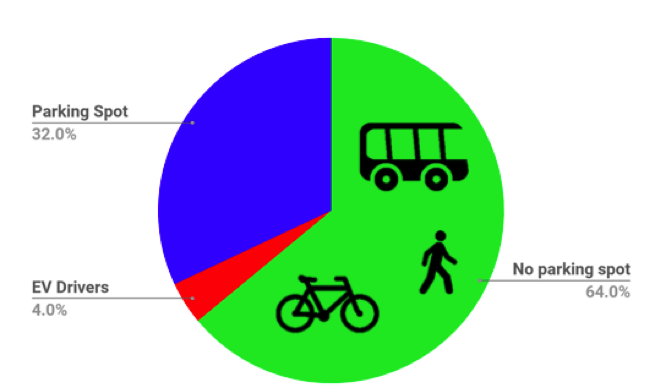
Choosing to Ditch the Car Commute: What Helps Office Workers Decide
Which is more valuable, a parking spot at work or help switching to a clean and healthy commute? That is the decision Rocky Mountain Institute (RMI) employees in Boulder, Colorado, made ahead of their move to the newly opened Boulder Commons North Building in the Boulder Junction district. Known as a parking cash-out program, this access plan allows employees to choose between a parking spot at the office or cash in lieu of parking, either to put toward an alternative commute or as a reward for not driving. RMI’s program provides all employees access to the office at the same or lower cost than providing parking for everyone. This type of commuter benefit program is widely used to control parking needs and costs in major cities throughout the United States, but RMI is demonstrating how, even in smaller urban settings, the program can be beneficial to employees and employers alike.
Boulder Commons is a first-of-its-kind green-lease, multitenant building specifically built with the future in mind. It is the first net-zero energy (meaning it produces on-site all the energy that it needs to operate, on an annual basis—in this case from solar photovoltaics) leased commercial space of its scale in the U.S. Each tenant is required to conform to aggressive energy goals, and the ultimate result is a more cost-effective, productive, and healthy space.
As part of the green-lease structure, parking costs are decoupled from rent, meaning the parking cost is a discrete line item that can be adjusted separately from the office space rent. This enables tenants to quantify the direct cost of parking at the building and affords them flexibility to reduce that parking expense without renegotiating rent. It also allows employers to compare the cost of parking with the costs of alternative solutions, such as buying their employees bus passes, providing transportation network company (TNC) or carshare credits, and encouraging biking and walking. For the developer, helping tenants support alternative commuting decreases parking demand, and thus the space required for parking. That space can be deployed for more profitable uses like additional rentable office space.
The Boulder Junction district, in which RMI’s new office is located, is a dense, multiuse development anchored by the Boulder Junction Bus depot—Boulder’s second-largest transit hub—and directly connected to Boulder’s extensive multiuse path system. This location, combined with on-site carshare, bikeshare, secure bike storage, and shower facilities, makes it ideal for implementing alternative commutes. As a result, RMI chose to rent just 40 parking spots for its 100-desk office space. To manage the remaining access, a cash-out program was implemented with early success.
For the first three-month pilot, 64 percent of RMI employees opted to cash out and use alternative options such as buses or bikes (Figure 1). An additional 4 percent of employees will drive electric vehicles, leaving just 32 percent of employees choosing to drive a personal gas-powered vehicle. Many of these drivers live in dispersed areas from which it is currently difficult or impossible to commute using alternative transportation modes.
Of those employees opting not to drive, 60 percent are switching from single-occupancy vehicle (SOV) commutes to busing and/or biking and walking. This will avoid 950 SOV miles and save 415 kg of carbon emissions every week. Additionally, nearly one-third of the SOV miles avoided are due to employees switching to using buses, reducing congestion and aggregating demand for transit services.
Although the impact of one 100-employee office will not alter the path of climate change on its own, scaling this easily implemented, cash-saving program sets the stage for large impact. If scaled to all 150,000 employees working in the Boulder area, this program would remove 1.85 million commuting miles and avoid 807,000 kg of carbon emissions every week; reducing congestion, improving air quality, and reducing stress associated with the dreaded commute traffic.
RMI’s program was specifically designed to be easily understood and deployed as well as adaptable to changing market forces and available commuting strategies. Due to the program’s simple design, focusing on a value per employee needing access, it can easily be deployed for companies of all sizes and across a diverse set of cities. Although parking cash-out is not a new transportation demand management strategy, this program shows that even in cities where parking is not expensive or not in short supply, a cash-out program can still offer cost-savings for employers when compared to companies paying for parking, due to reduced long-term obligations to pay for parking as part of the building base rent.
Promoting alternative commuting has widespread benefits reaching from property developers to employers and into the community as a whole. Reducing the need or desire to drive to work allows developers to build less parking, saving construction costs and limiting land development. These cost savings flow to the tenants of the building whose rent will not include payback for underutilized space, and ultimately to their employees, whose companies are not wasting revenue. The savings also extend to the surrounding communities through both more efficient land use and improved transportation options. Alternative commuting creates demand for shared services such as public transit, bikeshare and carshare, and multiuse paths. The reduction of single-occupancy cars driving into a community also improves air quality and relieves road congestion.
Shared mobility is quickly becoming an element of workplace culture, and by creating a plan that enables employees to take advantage of shared and active commuting alternatives, RMI is getting a head start preparing the company to adapt to the changing ecosystem. The current plan is just a pilot. Ongoing changes, such as the addition of other tenants to the district, seasonal adjustments to commuting patterns, and the advent of new technologies and services, will impact access needs. Nevertheless, the plan will help insulate RMI from increasing parking prices that will come as the district is completed. The rising cost of parking is a problem not only in Boulder, but across the world. As cities grow, parking demand and cost will also grow, driven by SOVs. No matter the city size, SOVs inhibit growth in dense areas. New commuting strategies can enable new growth and unlock new economic potential in small towns and exploding metropolises alike. The benefits of rethinking workplace access will be measured in Boulder and seen throughout the world.
Image courtesy of iStock.
